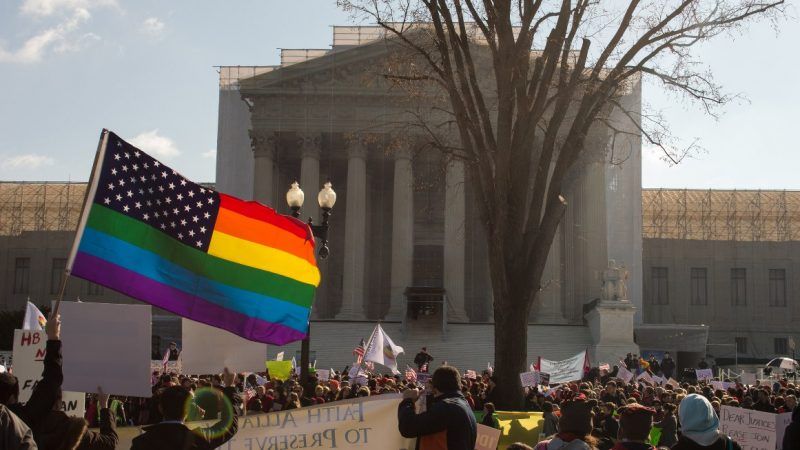Supreme Court To Consider Whether Civil Rights Act Protects Gay and Transgender Workers
Does current precedent forbidding discrimination on the basis of sex-based stereotypes apply here?

Lesbian, gay, and transgender activists have been working for decades to try to have sexual orientation and gender identity added to federal civil rights anti-discrimination protections. Now the Supreme Court is going to determine if those protections are, in fact, already there.
Today the Supreme Court agreed to combine and consider three cases that revolve around an unresolved legal question: Does the federal Civil Rights Act of 1964's ban on employment discrimination on the basis of sex also forbid discrimination against somebody for being gay or transgender?
For many, the immediate response would likely be, no, sexual orientation and gender identity are different from sex. That's why activists and friendly lawmakers have for years been introducing and reintroducing the Employment Non-Discrimination Act and now the Equality Act to try to have those two classifications added.
However, it's actually not that simple. In a Supreme Court decision from 1989, Price Waterhouse v. Hopkins, the justices ruled that discrimination on the basis of sex-based stereotypes counts as discrimination. That case revolved around a woman who claimed she was denied partnership in the accounting firm because she did not behave or dress femininely enough for them.
From that court precedent a new argument was crafted: Discriminating against somebody for being gay or transgender is similar to discrimination on the basis of whether a person exhibits "stereotypical" traits of a sex. After all, much of the workplace discrimination faced by transgender people is based on how they present themselves.
This argument has found legal traction in federal cases going all the way back to 2005. Under President Barack Obama, the Department of Justice (DOJ) and the Equal Employment Opportunity Commission (EEOC) accepted and endorsed this position, and that's what ultimately informed the administration's position that public schools can't tell transgender students which bathrooms they can use.
But the Supreme Court hasn't truly established this interpretation as law, and so there's been conflict on the federal level (and in federal courts). Under President Donald Trump's administration, the DOJ reversed its position, stating that the Civil Rights Act's sex discrimination protections don't extend to gay or transgender discrimination. But the EEOC maintained its position, causing a split of attitudes in the executive branch of the federal government. Likewise, federal court rulings have been contradictory here. Two federal courts have ruled that federal laws prohibiting discrimination on the basis of sex also cover discriminating against somebody because they're gay or transgender. But a third court has disagreed, creating a split and plenty of federal confusion over the limits of the Civil Rights Act's protections.
The Supreme Court had previously turned away requests to step in and rule on the conflict. But today they finally decided that they would hear three cases. Two of them involve workers alleging workplace discrimination for being gay. The third involves a transgender woman who was fired by the funeral home she was working at because she wanted to start wearing women's clothing to work. The owner of the funeral home said it would "violate God's commands" and would not accommodate the transgender woman's clothing requests.
This ruling, whichever way it goes, is going to be politically significant due to efforts to pass the Equality Act, which would end the conflict by explicitly adding sexual orientation and gender identity to the Civil Rights Act. A ruling favorable to LGBT workers and students would end the pressure to pass the law. A ruling that the Civil Rights Act does not include sexual orientation and gender identity would most likely turn passage of the Equality Act into an election issue.
Read more about the cases involved here.
